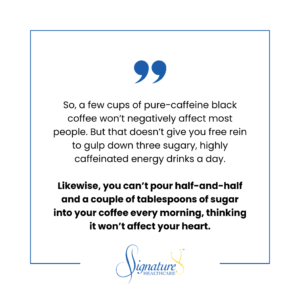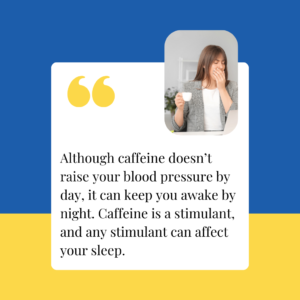Does Caffeine Raise Blood Pressure?
Have you ever been startled by a headline about the evils of caffeine, such as “Does Caffeine Raise Blood Pressure?” Maybe you were even worried… until the next day, when you spied another story about caffeine’s health benefits.
Confusing, right?
Because so many of us consume caffeine daily (often in multiple cups of coffee), the latest research — positive or negative — generates a lot of buzz. But with so many contradictory studies out there, which is most believable?
Does caffeine help you live longer? Or, on the other hand, does caffeine raise blood pressure?
What We Know So Far
Let’s take coffee, the source of most people’s daily caffeine fix.
Studies of coffee’s negative effects vary widely and are often biased or poorly conducted. Yet, in population-based or placebo-controlled trials, coffee consumption appeared to reduce mortality in some populations.
So, does caffeine raise blood pressure or cause other cardiovascular effects? If you’re a regular coffee drinker (five days a week or more), here are a few facts about its probable effect on you:
- In regular coffee drinkers, caffeine doesn’t elevate blood pressure. It can temporarily raise it in someone “caffeine-naïve”; that is, for a person who’s not a regular coffee drinker, blood pressure may increase by five to 10 mm of mercury, then return to normal in about an hour.
- Caffeine may increase your heart rate by a couple of beats per minute compared to someone who doesn’t consume caffeine. This effect diminishes over time.
- Caffeine doesn’t affect your cholesterol, for better or worse.
- Caffeine acts as a diuretic in both regular and occasional coffee drinkers. In more serious coffee drinkers, the diuretic effect lessens but never completely disappears.
- Caffeine may worsen issues for individuals with premature ventricular contractions (PVCs) or other cardiac rhythm abnormalities.
Everything in Moderation
So, a few cups of pure-caffeine black coffee won’t negatively affect most people. But that doesn’t give you free rein to gulp down three sugary, highly caffeinated energy drinks a day. Likewise, you can’t pour half-and-half and a couple of tablespoons of sugar into your coffee every morning, thinking it won’t affect your heart.
Adding those to your daily dose of caffeine cancels out any benefits. The effect is similar to drenching a healthy salad in high-calorie dressing.

Caffeine and Sleep
Although caffeine doesn’t raise your blood pressure by day, it can keep you awake by night. Caffeine is a stimulant, and any stimulant can affect your sleep.
If you drink six cups of coffee during the day and then have another cup with dinner, it should be clear why you struggle to fall asleep at bedtime or wake up at 2 a.m. Although I regularly drink at least two cups of coffee daily, a cup of joe consumed as late as 1 p.m. disturbs my sleep.
Consider dialing back your caffeine consumption in the afternoon.

Caffeine and Digestion
Do you experience heartburn or acid reflux? Caffeine drinks, particularly coffee, might exacerbate those issues.
Caffeine relaxes the sphincter between the esophagus and the stomach, allowing more acid to reflux. This is true with all forms of caffeine, whether coffee, iced tea, energy drinks, or chocolate (and even decaf drinks, unless they’re very low-acid).
For people with digestive issues like an irritable bowel, caffeine also aggravates the colon and causes issues with diarrhea.
Go Ahead — Enjoy Your Coffee!
So, to date, how much faith can we place in studies about caffeine and coffee?
- It may be true that people with an affinity for coffee often have a longer lifespan. But so far, there’s no definitive proof that coffee and other forms of caffeine benefit everyone’s health or add years to our lives.
- Likewise, if you worry, “Does caffeine raise blood pressure?” or ponder whether a cup or two of coffee a day is okay for your health, no solid data says it’s bad for you. Just remember, as with alcohol, to consume everything in moderation.
When it comes to caffeine, most people find their own sweet spot. (And speaking of “sweet spot,” here’s a final reminder to be prudent with those calorie-heavy additives like sugar and creamer.)
Has it been a while since you’ve checked in with your Signature Healthcare physician? We invite you to see us and enjoy a cup of the best coffee in Charlotte.

Dr. Marshall Silverman
Dr. Marshall Silverman, MD, a board-certified internal medicine specialist with over two decades of experience in Charlotte, combines his clinical role with academic pursuits as a clinical associate professor at UNC-Chapel Hill. His diverse interests span from disc golfing and woodworking to playing the violin and authoring illustrated children’s poetry books, reflecting a unique blend of medical professionalism and creative expression.

